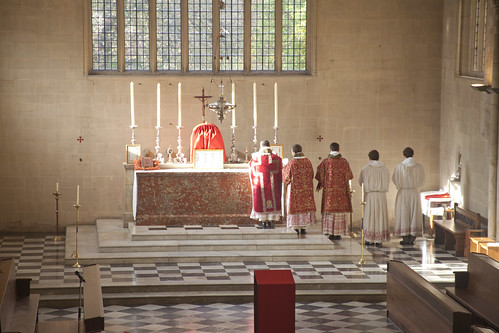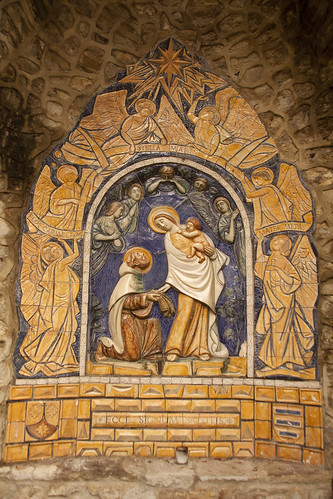Here is a clever little promotional video about Natural Family Planning, produced by these people here.
It is supposed to illustrate the advantages of NFP. It is also, unintentionally, illustrates the problems, not so much with the technique, but with how it is generally presented.
Now I think it would be great if couples using condoms and the Pill, and the other hideous methods of contraception, were to switch to NFP. Fish would appreciate not being saturated with estrogen. I incline towards the view that condoms deform the act of sex and that the standard Pill can cause abortions, as well as cancer; NFP has moral and prudential benefits all round. However, NFP has and will continue to have little take-up outside the Church because contraception is not, mostly, about cosy little planning meetings between a couple, it is about facilitating promiscuity, and even within marriage the notion of self-restraint is regarded as intolerable. The reality is that this video is only going to make headway with Catholics.
Labels
- Bishops
- Chant
- Children
- Clerical abuse
- Conservative critics of the EF
- Correctio Filialis
- FIUV Position Papers
- Fashion
- Freemasonry
- Historical and Liturgical Issues
- Islam
- Liberal critics of the EF
- Marriage & Divorce
- Masculinity
- New Age
- Patriarchy
- Pilgrimages
- Pope Francis
- Pro-Life
- Reform of the Reform
- Young people
Friday, October 31, 2014
Thursday, October 30, 2014
We are not facing a heretical Pope
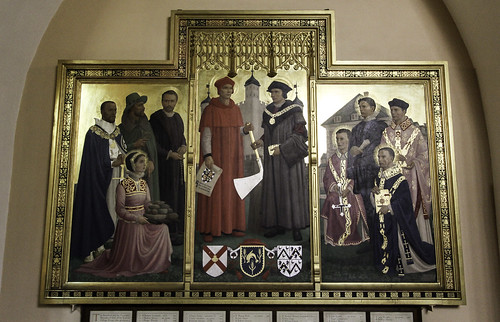 |
| The English Martyrs: triptych at Ushaw College. Photo by Fr Lawrence Lew OP |
Wednesday, October 29, 2014
FIUV Position Paper on Septuagesima, Vigils, and Octaves
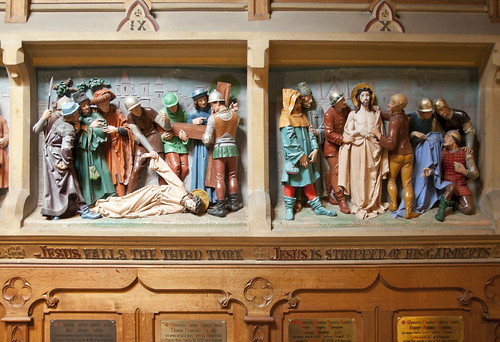
Over on Rorate Caeli I am today publishing the 20th of the series of short briefings, 'Position Papers', on aspects of the Extraordinary Form, which I have been coordinating for the Foederatio Internationalis Una Voce for the last two years. Go over there to read it. See all the Position Papers here.
In this post I will take the opportunity to say one or two other things about the issue addressed. It is a problem, in a practical way, for parishes where both the Traditional, Vetus Ordo and the reformed, Novus Ordo are celebrated, in that on a Sunday, between Masses, the liturgical colour has to be changed on the altar frontal, tabernacle veil and anything else using the colour of the season, three Sundays in a row, between green and violet. This is hardly the biggest problem facing the Church today, but it is an indication of a particular kind of crashing of gears which results from the lack of continuity of the new Mass with the old. It also happens here and there in the liturgical year when feast days have been moved or abolished. But there is something particularly awkward about a parish proposing a season of penance in one Mass on a Sunday, and carrying on as normal for the other Masses on the same day.
Tuesday, October 28, 2014
Oxford Pilgrimage 2014: Photos
Monday, October 27, 2014
Mgr Loftus defends the Terror
 |
| The Carmalite nuns of Compiegne, queing up for the guillotine. |
Here is the letter, from the well-known Catholic barrister Neil Addison.
Dear Sir
Even by his own standards the suggestion by Mgr Basil Loftus (19 October) that he looks forward to "a Franciscan revolution to eclipse in drama and extent the French Revolution" is bizarre.
Saturday, October 25, 2014
Astonishing Carfin
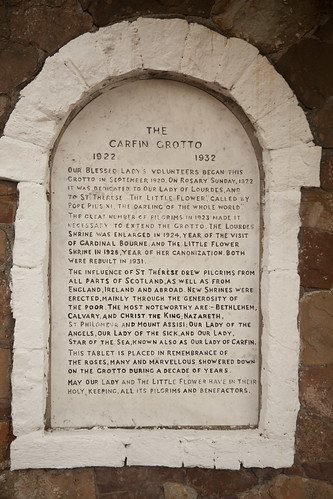 I visited the shrine at Carfin near Glasgow on the way south from holiday a couple of weeks ago. This is Scotland's national Marian Shrine; I was staggered, when I saw it, by its scale. There must be a score of statues, as well as recreations of the grotto of Lourdes, the scene of the vision at Fatima, and Calvary. There is an Exposition Chapel and a chapel dedicated to St Therese of Lisieux, as well as the large main church and a relic chapel.
I visited the shrine at Carfin near Glasgow on the way south from holiday a couple of weeks ago. This is Scotland's national Marian Shrine; I was staggered, when I saw it, by its scale. There must be a score of statues, as well as recreations of the grotto of Lourdes, the scene of the vision at Fatima, and Calvary. There is an Exposition Chapel and a chapel dedicated to St Therese of Lisieux, as well as the large main church and a relic chapel.Friday, October 24, 2014
Pro-Life Witness on Saturday
OXFORD PRO-LIFE WITNESSSaturday, 25th October3pm-4pmPlease note these guidelines (on advice from the police) for the pro life witness which we have had to implement as we have recently had counter-protesters.* We will all stand on the grass just in front of the Church wall. Please will everyone stand in a row. Young (and fit!) people can stand up on the wall if they choose.* The Holy Rosary will be led by Fr John Saward and he will not raise his voice in response to the protesters' noise. Our responses will also be quiet and reverent.* Please will everybody not enter into any discussions/debates with the protesters - the advice is to completely ignore them and to not make eye contact. (Evil hates to be ignored.)If you would prefer to pray inside the Church, please know we have Exposition of the Blessed Sacrament throughout the hour.
Thursday, October 23, 2014
LMS Oxford Pilgrimage, 25 Oct
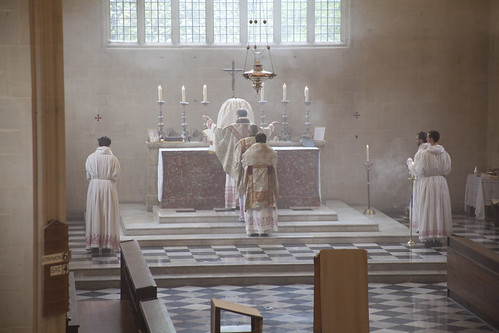 |
| High Mass in the Dominican Rite in Blackfriars, Oxford, at the 2013 Pilgrimage |
11am Solemn Mass in Blackfriars, St Giles’, Oxford.
2pm Procession, to the place of martyrdom of Bl George Napier in Oxford Castle
3pm Benediction in Blackfriars.
The plaque marking the place of Bl George Napier's maryrdom was blessed by Archbishop Bernard Longley during the LMS Pilgrimage in 2010, the 4th centenary of his death.
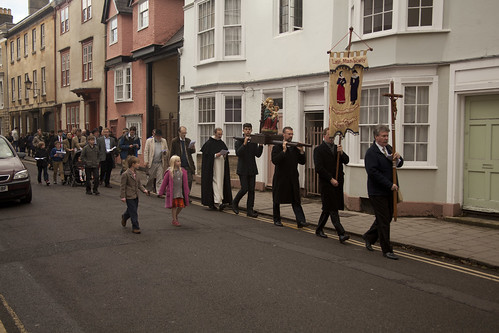
The church of Blackfriars is the Priory Church of the Oxford Dominican community in Oxford, located on the West side of St Giles, OX1 3LY. There is limited stay parking in St Giles and Wellington Square, and car parks in Gloucester Square, Worcester Street and Westgate.
View Larger Map
Bl George Napier (or Napper) was born in Holywell Manor, Oxford, in 1550, and attended Corpus Christi College 1566-1568, until ejected for recusancy. He was ordained in Douai in 1596 and was sent on the English mission in 1603. He was captured near Kirtlington, north of Oxford, in July 1610, and was executed on the Castle gallows on 9th November the same year. He was beatified in 1929 by Pope Pius XI.
Dialogue at Bl George Napier's execution:
A Protestant minister: ‘Napper, Napper, confess your treason.’
Napper: ‘Treason, Sir! I thank God, I never knew what treason meant.’
The minister: ‘Be advised what you say, do not you remember how the judge told you it was treason to be a priest?’
Napper: ‘For that I die, Sir, and that judge, as well as I, shall appear before the just Judge of heaven, to whom I appeal, who will determine whether it be treason or no to be a priest.’
Taken from Memoirs of Missionary Priests
by the Rt. Rev. Dr. Challoner Vicar Apostolic.
by the Rt. Rev. Dr. Challoner Vicar Apostolic.
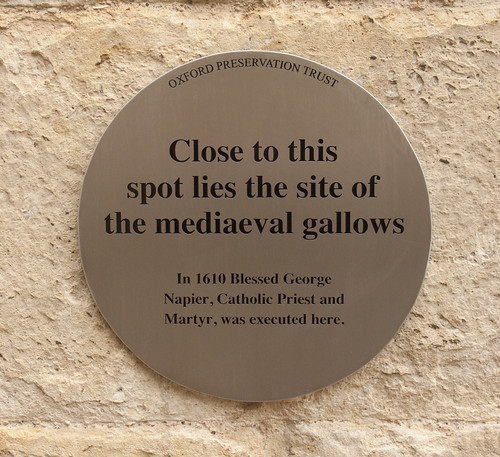
Support the work of the LMS by becoming an 'Anniversary Supporter'.
Wednesday, October 22, 2014
Infallibility, Ultramontanism, Sede Vacantism
 |
| The Cross stands while the world turns. |
Over on Rorate Caeli there's an interesting article by John Zmirak. I agree with the general thrust of the article, although some of it lacks theological precision, and I want to focus on something which is clearly, and sadly, true. Asking what will happen if there is an official accommodation with adulterous relationships, he writes:
Some conservatives who value authority over truth will dutifully defend this papal decision, and pretend that they never argued against it in the first place. Some traditionalists will split off altogether, and claim that Pope Francis became a heretic and lost his office as pope. They may even gather and elect an anti-pope.
We have here the twin temptations of faithful Catholics who see, or think they see, a divergence between perennial moral (or other) teaching and papal authority. Deny the one, or deny the other.
Some conservatives who value authority over truth will dutifully defend this papal decision, and pretend that they never argued against it in the first place. Some traditionalists will split off altogether, and claim that Pope Francis became a heretic and lost his office as pope. They may even gather and elect an anti-pope.
We have here the twin temptations of faithful Catholics who see, or think they see, a divergence between perennial moral (or other) teaching and papal authority. Deny the one, or deny the other.
Tuesday, October 21, 2014
The restoration continues: Willesden
The Shrine of Our Lady of Willesden in North West London, the restored Medieval Shrine visited by St Thomas More and St Josemaria Esciva, has been restored by its custodian, the Parish Priest Fr Stephen Willis. Fr Willis has also, at the request of Cardinal Nichols, started a weekly Traditional Mass in the church.
The church is rather fine, and on the occasion of the annual LMS Pilgrimage to this shrine, the foremost Marian shrine in the Archdiocese of Wesminster, I have photographed it: see here. The shrine itself is in a side chapel.
Before restoration:
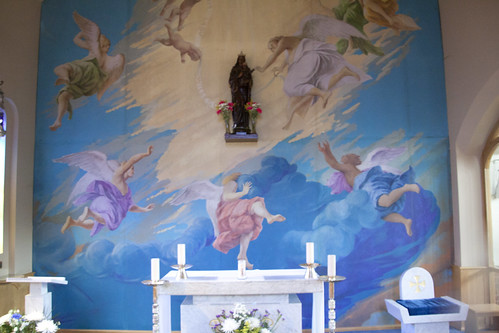
The church is rather fine, and on the occasion of the annual LMS Pilgrimage to this shrine, the foremost Marian shrine in the Archdiocese of Wesminster, I have photographed it: see here. The shrine itself is in a side chapel.
Before restoration:

Monday, October 20, 2014
Could a person in an objective state of grave sin receive Communion?
 |
| It was not his grasping the good of money which saved Zachaeus, but his repentance. |
But here is an idea we may well find popping up. (Remember that 'subjective' means 'from the point of view of the subject'. A sin can be objective but not subjective if the agent did an action at variance with his properly understood duty which, for some innocent reason, he didn't realise was his duty.)
There is a general principle that for a sin to be 'mortal' it must be 'grave matter' (it must be a serious thing), and also that the agent must be aware that it is grave. If you don't know that the medicine bottle contains poison you are not committing murder if you hand it to the patient. If you don't know about the decree on Friday abstinence you don't sin if you don't observe it. If you had no idea that in some complicated situation you should do X and not Y, then you haven't committed a sin if you do Y. In other words, mortal sin must be against the agent's conscience: it must be subjective as well as objective.
Great use was made of this after Humanae vitae came out in 1968. Liberal priests got the brilliant idea that if they didn't tell people that the contraceptive use of the Pill was a sin, then couples could use it without committing a sin. They called this 'leaving them in good faith.'
The case with the divorced and remarried is a bit different, but it might work like this.
1. If a couple says that they are convinced in conscience that their sexual relations are licit, because of their circumstances, then they are not in a state of mortal sin (at least, not because of that).
2. Those conscious of being in a state of mortal sin shouldn't approach Communion, but this doesn't apply in this case.
3. The couple could not only be convinced themselves, but could convince their pastor or bishop that they are so convinced. The bishop could give them a little chit to that effect; the pastor could give them Communion in good conscience; and so on.
Neat, eh? That's what Pope Francis calls 'casuistry'. Well, it is casuistry. Now, here are the problems with this line of reasoning.
1. Natural Law is written on our hearts (Romans 1:20). Ignorance of Natural Law is not so easy, and when it does occur it may well be culpable. St Paul taught that the Romans' idolatry was a sin because they knew deep down that there was only one God, the creator of the world, or (perhaps) they could have known it if they had thought about it seriously. The Romans might have protested about this, but they were not in good conscience.
a) We can never erase our knowledge of moral principles such as that killing the innocent is wrong, or that adultery is wrong. In the case of remarried divorcees the individuals are furthermore not ignorant, but, rather, painfully aware of the teaching of the Church.
b) If we convince ourselves that something gravely contrary to Natural Law is ok, we have almost certainly committed a sin along the way: of failing to take the teaching seriously, of failing to investigate the matter conscientiously, and of failing to pray for light. Is it possible that a series of non-mortal sins could leave you ignorant of the Natural Law, to the extent that a voluntary gravely sinful action does not leave you in a subjective state of mortal sin? Possibly. But we are grasping at straws here; that is not the impression St Paul leaves us, and it is hard to see how a parish priest or bishop could establish to his satisfaction that this was indeed the case for a particular individual.
2. The scandal caused by giving Communion to these couples derives from their objective state, not their subjective state. Along with the harm it does to the communicant, the priest has an overriding reason not to give Communion to a couple who are widely known to be in an illicit union, because to give it to them would be to cause others to sin (that is what 'scandal' means). Even if they only appear to be living in an illicit union - if, say, they are living as brother and sister - this needs to be handled with care, and in some cases it will be best to give them Communion in private. A casuistic solution to their subjective state won't change this side of things.
3. A couple in a state of objective sin without being in a state of mortal sin, are still in a seriously bad way. A couple who are convinced their marriage is valid, or licit, when it isn't, haven't (for that reason) committed a mortal sin, but they haven't received the graces of the sacrament, or the natural graces of a natural marriage. A person who thinks it is right to perform bad actions may not be committing a mortal sin, but these actions won't gain him merit, they won't build up his virtue, they won't draw him closer to God: no, frequent objectively evil actions will draw him away from God, they will coarsen the agent's conscience, they will make it harder to repent, and will establish evil habits, vices.
Objective states matter. To leave people 'in good faith', or even to encourage them to remain 'in good faith', in an objectively sinful situation, is not mercy, it is not bringing people into the field hospital, it is leaving the wounded man to die by the roadside. And that would be the real result of a system allowing them to receive Communion.
This is why it was so problematic to talk about 'seeing the good' in or 'valuing' illicit unions, cohabitations, homosexual sex, and so on. Yes of course the individuals are seeking the good: Aquinas teaches that Satan was seeking a good when he refused to serve God and fell into Hell. And yes, there can be a kind of fidelity in an illicit union: St Augustine said that about his relationship with his concubine before his conversion. The problem is that these are not paths to holiness. We might hope they are compatible with paths to repentance: repentance is assisted by 'actual' grace rather than 'sanctifying' grace, if along the way the agents are doing good actions, or praying. But you don't get any kind of grace from objectively evil actions.
The focus of the 'good faith' type of argument are the concepts of obligation and punishment: we won't be punished for what we do in good faith. It derives from a legalistic approach to morality. What it neglects is the spiritual life, the role of grace. That, of course, has always been the problem with casuistry. We mustn't let Kasper-like logic-chopping casuistry cut people off from the life of grace.
Support the work of the LMS by becoming an 'Anniversary Supporter'.
Sunday, October 19, 2014
The Synod: where do we go from here?
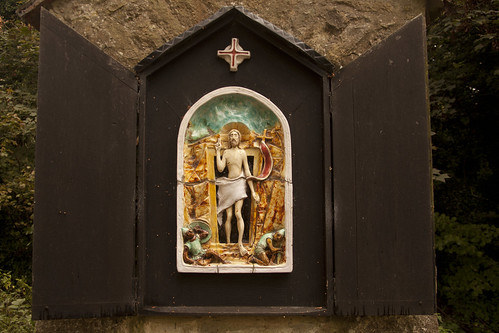
After the strange 'Relatio' published in the middle of the two-week Synod, we've seen a remarkable turn-around of events. It would seem that participants successfully demanded that the reports responding to this Relatio of the 'circuli minores', the small discussion groups, be published. These revealed the truth of what a number of Synod Fathers had been saying: that the liberal tone of the Relatio completely failed to reflect the views of the participants. Once the reports of the circuli minores were published, it was impossible for the people drawing up the final report to ignore them: the dishonesty would have been too obvious. Furthermore, the very unrepresentative team producing the report was joined by Cardinal Napier in the interests of balance, and the Synod got the opportunity to vote on the final report. The result has been a final report, though not the detailed reaffirmation of the Church's teaching one might have wished, a million miles away from the mid-term Relatio, which offers no comfort to those who want to see the Church's teaching and discipline pulped. Pope Francis wrapped the proceedings up with an elaborately balanced speech.
What we have seen this fortnight is, nevertheless, quite scary. We have witnessed the operation, exposure, and defeat, of a ruthless attempt to manipulate the synod and, through the synod, the whole Church. There is no reason to imagine the threat this represented is going to go away. There is going to be a new, bigger synod on the same subjects this time next year, and there is every reason to suppose that the same people will be in charge. The people who produced a grossly one-sided pre-synod questionnaire, and published the responses from Germany (which had the right answers) and not elsewhere (which may not have); the people who published the ludicrously liberal talk from the lay couple to the synod, because they agreed with it, but refused to publish the cardinals' speeches, because they didn't always; the people who produced the mid-term Relatio pushing things in their favoured direction, in complete disregard for the views it was supposed to reflect. They've been given a bloody nose, but they aren't going to give up. Next time they may win: they may get a final report out along the lines of the mid-term Relatio, or even something worse. We must fact the fact that this is perfectly possible.
Saturday, October 18, 2014
The Schellhorn Music Composition Prize
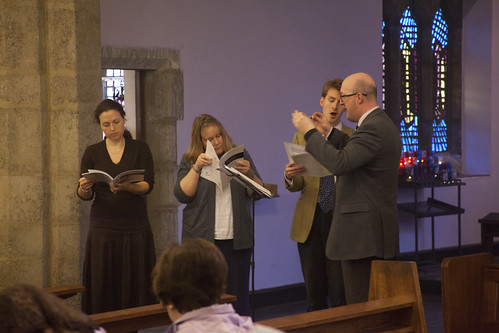 |
| Matthew Schellhorn directing the choir at the LMS Aylesford Pilgrimage |
The prize has been established by Matthew Schellhorn, the pianist, in honour of his parents.
The full details are here.
The Latin Mass Society has, as an object, the promotion of the Church's musical patrimony. This is not just a matter of the performance of old pieces: our musical tradition, like our liturgical tradition in general, is a living thing, and that is why we have not one but two Catholic composers among our Patrons, Colin Mawby and James MacMillan.
Support the work of the LMS by becoming an 'Anniversary Supporter'.
The full details are here.
The Latin Mass Society has, as an object, the promotion of the Church's musical patrimony. This is not just a matter of the performance of old pieces: our musical tradition, like our liturgical tradition in general, is a living thing, and that is why we have not one but two Catholic composers among our Patrons, Colin Mawby and James MacMillan.
 |
| St Cecelia |
Support the work of the LMS by becoming an 'Anniversary Supporter'.
Why liberals are united and conservatives divided: Part 3
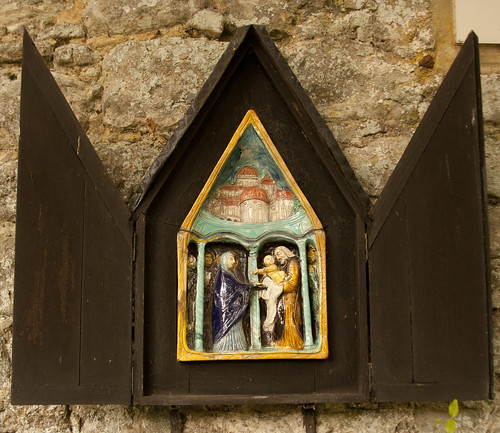
Part 1 of this series.
Part 2 of this series.
Part 3 of this series.
In the aftermath of Vatican II, opponents of the radical deconstruction of the Church (what Pope Paul VI, soon to be 'Blessed', called its 'autodemolition'), had to decide on a strategy. Since this was not going to be a purely negative strategy of attacking something from all and any side, like the radical liberal strategy, it was going to require serious thought and difficult judgments.
(As an aside, conservatives are perfectly capable of allying with others when a purely negative objective is in view. Explaining his alliance with Stalin, Winston Churchill said: 'If Hitler had invaded Hell, I would at least have made a favourable reference to the Devil in the House of Commons.')
The people we call 'neo-conservatives' decided to accept the reformed liturgy, give the best interpretation possible to everything coming out of Rome, and to rally round those aspects of doctrine which were being most vigorously upheld in the Papal Magisterium, which were issues of sexual morality and abortion. Pope Paul VI issued Humanae Vitae condemning contraception; St John Paul II turned out to have even more to say on this, and on abortion as well; Pope Benedict XVI also had a very clear track-record on these issues.
Friday, October 17, 2014
Why liberals are united and conservatives divided: Part 2
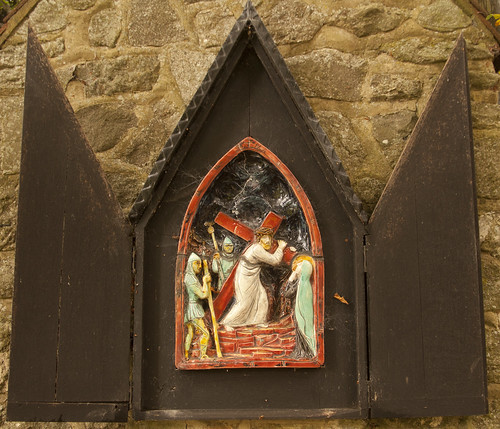
Part 1 of this series.
Part 2 of this series.
Part 3 of this series.
The key to the unity of the liberals and leftists is that their immediate aims are negative: they aim at destruction. The common ideological thread is that traditional structures, whether economic or social or doctrinal and liturgical, are oppressive and stop people from flourishing. They unite to destroy these things. Since they can be undermined and destroyed from many angles, having different groups working at it from idiosyncratic perspectives is a positive advantage. Radical feminists want to destroy marriage because they see the family as a patriarchal power-structure; homosexual activists want to destroy marriage because they want their own relationships to be accorded equal status as married relationships. These two groups do not agree about anything apart from the importance of destroying marriage, and they attack marriage with completely different arguments. The incoherence of the overall attack doesn't matter; it serves only to make the anti-marriage coalition appear all the more comprehensive.
Thursday, October 16, 2014
Why liberals are united and conservatives are divided: Part 1
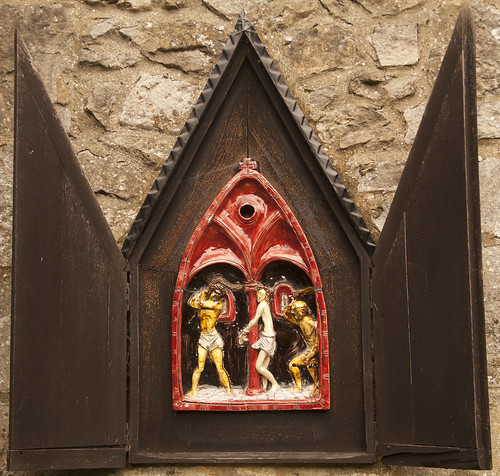
Part 1 of this series.
Part 2 of this series.
Part 3 of this series.
This isn't a bad moment to reflect on something which is often said: while liberals support each other in their efforts, conservatives often don't, and lose out that way. Peter Kwasniewski mentioned it today, in an aside. Speaking of Bugnini and his colleagues, he writes:
They were men who seized their opportunities and did not sit on their hands wondering when other people would do the job for them, or worse, waste their time on endless bickering and hairsplitting. Like our political liberals, they could lay aside small differences for the sake of gaining major objectives.
My question is: why is it so often the case that liberals and leftists are able to present a united front and their conservative opponents cannot? And can it be remedied?
Wednesday, October 15, 2014
Tuesday, October 14, 2014
Synod 'relatio': a stepping-stone to a brick wall
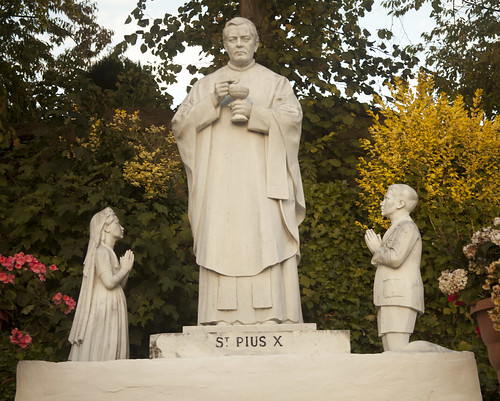 |
| St Pius X, the great promoter of frequent Communion, including for children. Statue at the shrine of Carfin, outside Glasgow. |
Just ask yourself:
Has the grave wrongness of genital sexual acts outside marriage always been taught by the Church?
Obviously, it has. And then:
Does the Church have the authority to change the teaching of St Paul that Holy Communion received while in a state of grave sin does not confer grace but rather increases the communicant's guilt (1 Cor 11:26-30)?
Obviously, she has not.
These are the fixed features of the theological landscape; there is absolutely nothing anyone can do about them, except ignore them. For the most part preachers have been ignoring them for the last 60 years, and if this had solved the pastoral problems, then this Synod would have been unnecessary.
Obviously, she has not.
These are the fixed features of the theological landscape; there is absolutely nothing anyone can do about them, except ignore them. For the most part preachers have been ignoring them for the last 60 years, and if this had solved the pastoral problems, then this Synod would have been unnecessary.
Sunday, October 12, 2014
Rewriting the history of Blackfen
 |
| Fr Steven Fisher, Twitter profile picture: taken a few years ago. |
Instead of ending his celebration of the Traditional Mass at the end of September, as he had promised, Fr Steven Fisher has carried on saying it at 10:30 on Sundays for the subsequent two Sundays. Having precipitated the resignations of the sacristan, Master of Ceremonies, and the entire choir, and told the congregation in general that they were thoroughly objectionable people, Fr Fisher is now saying (in the Newsletter: which is not online), that, given the strange decline in the number of people attending that Mass, he is going to ask the Parish Council, which he has appointed, to consider its future.
 |
| Fr Steven Fisher, an old Facebook profile picture, more recent. |
Lest we forget the sequence of events, Mulier Fortis, who is actually a member of the former Blackfen EF congregation, has taken the trouble to remind us.
 |
| Fr Steven Fisher, a still more recent FB profile picture. |
Support the work of the LMS by becoming an 'Anniversary Supporter'.
Saturday, October 11, 2014
Photos of Holy Trinity, Hethe
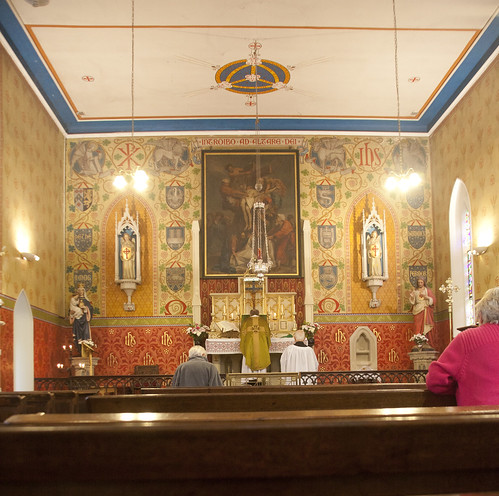
Last Sunday I attended Low Mass in Holy Trinity Hethe; it will take place again tomorrow, at 12 noon (map and details).
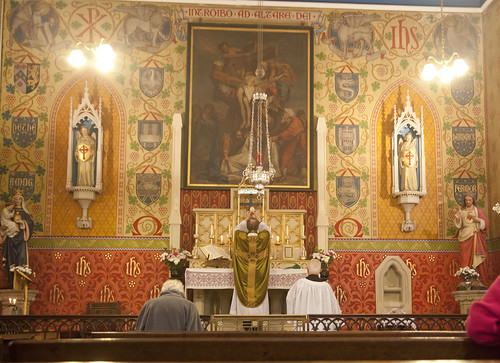
Friday, October 10, 2014
The gay son and his partner: Cardinal Burke speaks
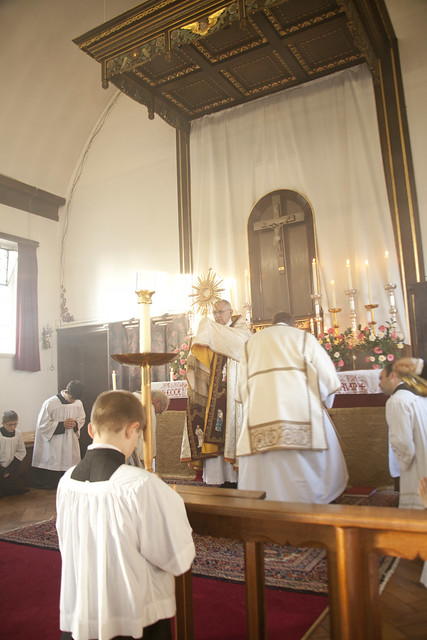 |
| Benediction on Corpus Christi, SS Gregory & Augustine's, Oxford |
Cardinal Burke: This is a very delicate question, and it's made even more delicate by the aggressiveness of the homosexual agenda. But one has to approach this in a very calm, serene, reasonable and faith-filled manner. If homosexual relations are intrinsically disordered, which indeed they are — reason teaches us that and also our faith — then, what would it mean to grandchildren to have present at a family gathering a family member who is living [in] a disordered relationship with another person?
Wednesday, October 08, 2014
LMS and the Guild of St Clare at Towards Advent: Nov 22nd
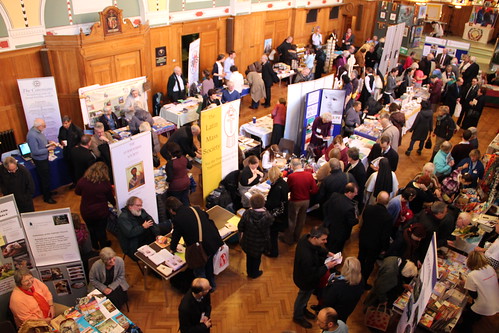
As for the last few years, the Latin Mass Society will be - literally - setting out its stall at the Towards Advent Festival, which takes place in Westminster Cathedral Hall on Saturday November 22nd 2014.
A corner of the same stall is occupied by the Guild of St Clare, the LMS-affiliated needlecraft group, who introduce participants to their work and raise money by selling Christmas Tree decorations and cakes.
The Cathedral Hall is where we've often had our Annual General Meetings. It is behind the Cathedral, the entrance is in Ambrosden Avenue.
The Festival is free: anyone can pop in and have a look at the stalls, a lot of Catholic organisations are represented. It opens at 10:30 and goes on until about 5pm. As well as membership organisations like us and the Catenians, there are publications (The Catholic Herald and Oremus, the Westminster Cathedral magazine), at least one bookstall, Our Lady's Books who had an excellent stall at the LMS Conference in April, and groups with all sorts of interesting apostolates.
There are also events scattered through the day, notably an opening address by Mgr Keith Newton, Ordinary of the Ordinariate of Our Lady of Walsingham, and workshops (£2 each), for example one on Gregorian Chant. More information can be found here.
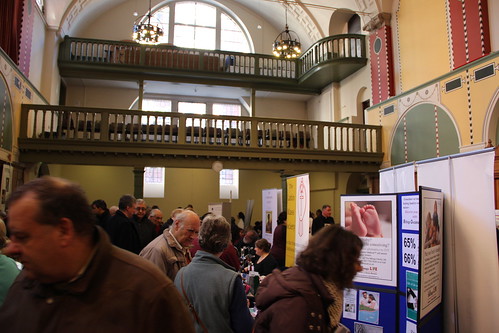
Support the work of the LMS by becoming an 'Anniversary Supporter'.
Tuesday, October 07, 2014
Conference and Mass for Michael Davies: photos
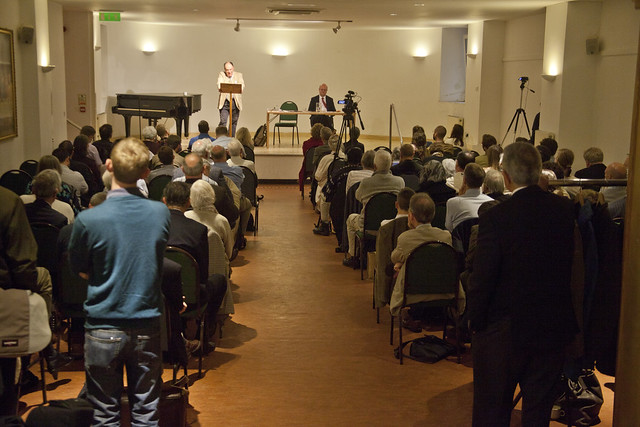
The conference on Saturday was a great success. The hall under St Mary Moorfields was packed, with about 100 people, listening to many of the biggest lay names in the English-speaking traditional movement: Michael Mat, Chris Ferrara, John Rao and James Bogle.
The High Mass of Requiem which took place afterwards was equally well attended, and was celebrated by Fr Anthony Conlon, assisted by Fr Gabriel Diaz and Fr Sean Finegan. Apart from Fr Diaz, who very kindly stepped in at short notice, the speakers and sacred ministers were all people who went back a long time with Michael Davies. It was a truly splendid memorial for him.
Video of the conference talks should be available before too long. My photos are here.

Support the work of the LMS by becoming an 'Anniversary Supporter'.
Monday, October 06, 2014
More uninformed bile from Paul Inwood
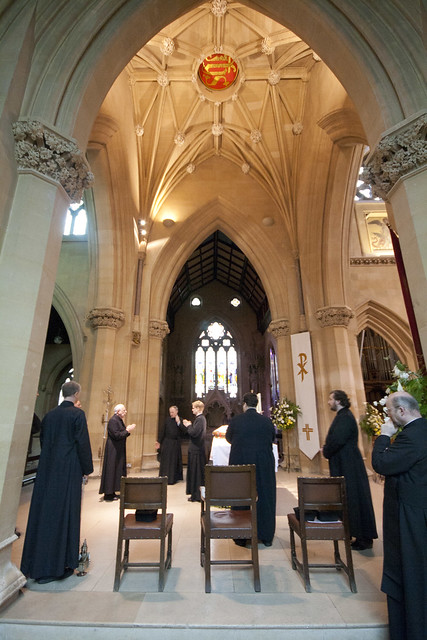 |
| Training in High Mass at the LMS Training Conference at Belmot Abbey this year. |
I am completely in agreement with Jack Wayne when he says that priestly training should prepare ordinands to minister to the entirety of their flock, but that is surely not the end of the story.
The proportion of the flock represented by adherents of the EF is a tiny fraction of 1%, and yet we find that some seminaries are devoting a disproportionate amount of time to celebrating in this form, and a hugely-disproportionate amount of time to training ordinands to celebrate in this form.
It may be revealing that a number of seminarians and young priests exposed to the EF in England and Wales in recent times have rejected training in this form of the rite because of the ecclesiology that goes along with it. The “bishop-bashing” that is prevalent in the course of some training sessions, especially those run by bodies such as the Latin Mass Society, is unseemly as well as unhelpful to their cause.
Talking of undermining one's own cause, Inwood would have more credibility in his attacks on the Latin Mass Society if his factual claims bore any relationship with reality.Saturday, October 04, 2014
Friday, October 03, 2014
New EF Sunday Mass: from this Sunday, Hethe
 |
| Holy Trinity, Hethe (photo from Wikipedia Commons) |
It is an important historic church, and the Mass is the initiative of the new Parish Priest, Fr Paul Lester.
Mass will be at 12 noon; it will be Low, though in the future we hope to have some Sung Masses here.
The address is Hardwick Rd, Bicester, Oxfordshire OX27 8EY
Support the work of the LMS by becoming an 'Anniversary Supporter'.
Thursday, October 02, 2014
Bishop Conry, Fr Longenecker, and forgiveness
 Opening the trad-bashing neo-conservative Fr Longenecker's blog post on Bishop Conry I thought I'd be reading something with which I could agree, for a change, but it was not to be. Here comes Fr Angry.
Opening the trad-bashing neo-conservative Fr Longenecker's blog post on Bishop Conry I thought I'd be reading something with which I could agree, for a change, but it was not to be. Here comes Fr Angry.Forgiveness may be offered, but for it to activate it has to be asked for. It takes two to forgive. You may wish to forgive someone, but unless they acknowledge what they’ve done and sincerely request forgiveness it remains a one way street.
...
Conry went on to put up his hand and say, “Yup. I did wrong. I’m sorry about that. I’m sorry I let you down.” Combined with his other statement this sounds more like, “Hey guys. It looks like the tabloids have got the story. You caught me. My bad. I’m out. See ya.” In other words, no real repentance and not so much “I’m sorry” but “I’m sorry I got caught.” What we did not hear was Bishop Conry’s full affirmation of the Catholic Church’s teaching on marriage and sexual morality.
There is something seriously wrong with both quoted passages.
Wednesday, October 01, 2014
Corrupt bishops: why it is a problem: Part 3
 I ended my last post by saying that, when they elected Bishop Conry as chairman of the department of Evangelisation and Catechesis in 2009, the bishops of England and Wales were fooled. What, exactly, were they fooled by, and how can we avoid falling into the same trap?
I ended my last post by saying that, when they elected Bishop Conry as chairman of the department of Evangelisation and Catechesis in 2009, the bishops of England and Wales were fooled. What, exactly, were they fooled by, and how can we avoid falling into the same trap?Conry is not a pantomine villain. Fr Alexander Lucie-Smith, a priest of Bishop Conry's diocese, Arundel and Brighton, reminds us
He was very popular with many people, and his kindness to the sick on the Lourdes pilgrimage and his rapport with the young will be long remembered.
Many traditional priests and Faithful in Arundel and Brighton saw another side of his character; Bishop Conry's open-mindedness did not extend to the Traditional Mass. It must be said that Bishop Conry was a divisive figure, and leaves a divided diocese: feelings about his resignation are, well, polarised. Nevertheless, the fact remains that for many, he was just terribly nice. He didn't stand on ceremony, he was relaxed, he had friendly chats with those on the margins of the Church and they came away from these meetings with a happy feeling, he accommodated himself and his diocese to the adoption of children by homosexual couples, he was capable of warm friendships... Aren't you beginning to see the problem?
Subscribe to:
Comments (Atom)
